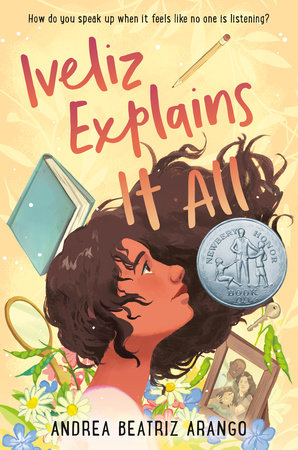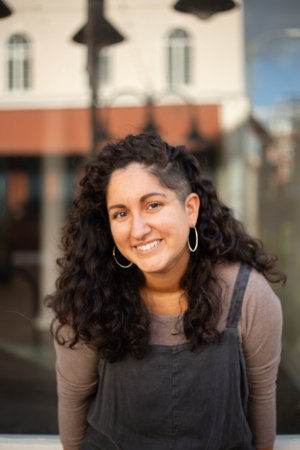Author Post: Andrea Beatriz Arango
I’ve always loved books that are in conversation with each other. As a kid, and now as an adult, the references that authors would sprinkle throughout their novels seemed like small gifts—side quests I could explore once I was done reading that particular book. Twelve-year-old me didn’t have the gift of Google, but that didn’t stop me from doing my very best to follow the breadcrumb trails some authors left behind. Iveliz Explains It All is written in verse because Iveliz loves poetry. This, combined with the fact that kids nowadays often have their own phones or can easily connect to the internet at school, shaped the references I included for Iveliz’s readers to find.
I don’t remember when I first discovered spoken word poetry, but I was old enough that this discovery happened on YouTube and not in real life. I remember watching, transfixed, wishing that slam poetry nights and competitions existed anywhere close to home. Not so I could perform myself, necessarily, but so I could watch. I was hypnotized by the confidence of these poets and their way with words, enamored with how much more these poems felt like storytelling and not just verse. Discovering this kind of poetry not only shaped me as a writer but completely transformed how I taught poetry. Teenagers who once had groaned at the thought of our poetry unit were now engaged. These poets spoke to them in ways the ones in their textbooks didn’t, and I loved getting to see some of them write their own poems to perform in class.
It would be many more years before I discovered novels-in-verse, but when I finally did, it was like everything I loved about spoken word and novels had merged into an art form I could have never imagined. Here were written poems, storytelling poems, speaking an entire novel without a single paragraph. These books were beautiful, heartfelt, and just begging to be read aloud.
Elizabeth Acevedo was the first Latinx poet I found who did both. Her slam poems about her name and her hair had me in tears. When The Poet X came out a few years later, I knew she was carving a path to something different, though I didn’t yet believe publishing my own work was a dream I could achieve. Later, during the pandemic, I found Elisabet Velasquez on Instagram. She had a book deal by then, and I remember thinking: There are Puerto Ricans out here doing this. Yo puedo hacer esto también. The poem Iveliz’s friend Amir gives her toward the end of the book is from Elisabet’s debut YA novel, When We Make It, because by the time Iveliz and I had reached the end of this story, it felt like we had made it, too.
All this to say that there are so many poets out there sharing their words through various media. The internet has made it so wonderfully easy for people to experience each other’s work. And while I don’t know if every reader will look up the poets I reference in my book, I’d love to imagine teachers and librarians using these references in lessons—showing kids that there are so many different ways to be an artist, to be a writer, and if they want to create poetry, they absolutely can.

Iveliz Explains It All By Andrea Beatriz Arango; illustrated by Alyssa Bermudez
How do you speak up when it feels like no one is listening? In this moving novel in verse, one girl takes on seventh grade while facing mental health challenges, and must find her voice to advocate for the help and understanding she deserves.
"Powerful." —Lisa Fipps, Printz Honor-winning author of Starfish
Listen up:
The end of elementary school?
Worst time of my life.
And the start of middle school?
I just wasn’t quite right.
But this year?
YO VOY A MI.
Seventh grade is going to be Iveliz’s year. She’s going to make a new friend, help her abuela Mimi get settled after moving from Puerto Rico, and she is not going to get into any more trouble at school. . . .
Except is that what happens? Of course not. Because no matter how hard Iveliz tries, sometimes people say things that just make her so mad. And worse, Mimi keeps saying Iveliz’s medicine is unnecessary—even though it helps Iveliz feel less sad. But how do you explain your feelings to others when you’re not even sure what’s going on yourself?
Powerful and compassionate, Andrea Beatriz Arango’s debut navigates mental health, finding your voice, and discovering that those who really love you will stay by your side.




